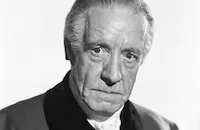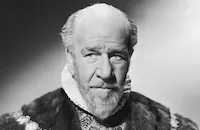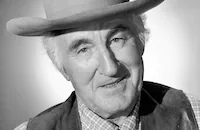Vanessa: Her Love Story

Brief Synopsis
Cast & Crew
William K. Howard
Robert Montgomery
Helen Hayes
May Robson
Otto Kruger
Lewis Stone
Film Details
Technical Specs

Synopsis
In 1880, while celebrating her one-hundredth birthday, widowed Herries clan matriarch Judith Paris complains of the family's dullness and advises her granddaughter Vanessa to seek "life" instead of mere happiness, which she says is for dull people. Benjamin "Benjie" Herries, the black sheep of the Herries family, is distantly related to and in love with Vanessa, but admits that he is a hedonist and a vagabond and needs an adventure before settling down to love. Despite her strict Cumberland, England upbringing, Vanessa loves the handsome rogue and swears that she would prefer to be miserable with him than be happy with anyone else. Benjie leaves Vanessa for one year in order to "sow his wild oats," but not before securing an engagement to his sweetheart. In his absence, Vanessa takes comfort in her friendship with Barney Newman, one of England's most famous novelists, and thwarts suitor Ellis' attempts to marry her. One year after his departure, and just as Ellis attempts his second proposal, Benjie returns with plans to marry Vanessa in three days. Vanessa's father Adam privately admits to Benjie that he has been suffering from heart trouble, but does not want to worry his daughter with the knowledge of his illness. When Adam suffers a heart attack and accidentally ignites a house fire, Benjie rushes to rescue the family, but can only save Vanessa, who later blames him for her father's death. Upset, Vanessa banishes Benjie, who then goes on the road to drown his sorrows in drink. Marion, a barmaid, takes an interest in Benjie, marries him and becomes pregnant. One day, Vanessa finds Benjie and apologizes to him, but she is told that he is now married and soon to be a father. At first Vanessa begs him to run away with her, but then remembers that he would be deserting his child. Vanessa asks her grandmother for advice and is told to accept an invitation from Ellis' mother to visit them in London. Some time later, a spring marriage between Ellis and Vanessa is announced, and Ellis personally addresses an invitation to his rival Benjie, who is in Egypt fighting in the First Egyptian Cavalry. Following their marriage, Vanessa discovers that Ellis suffers from a mental condition, which he describes as a headache that feels like "spiders in the brain," and which manifests itself in the form of paranoic outbursts. After Barney tells Vanessa that Benjie has lost an arm in battle and plans to call upon her, Ellis, in a fit of jealousy, accuses her of deceiving him and locks her in a room with him. Ellis picks up a knife and threatens to end both their lives, but Vanessa talks him out of it. When Benjie returns to London, he tells her that his wife divorced him and that his child died shortly after it was born. Vanessa brings Benjie home, whereupon the enraged Ellis throws them out. Though she is obligated to remain married to her husband under English law, which forbids divorce under circumstances of insanity, Vanessa returns to Cumberland, where she stays with Judith. Gossip travels fast through the small town, however, and after locals unfairly attack Benjie for having an affair with a married woman, he tells Vanessa that he must leave. She decides to go with him, but when she receives a letter from London summoning her to her husband's deathbed, she goes to him. Barely able to recognize his wife, Ellis takes Vanessa back and forces her to promise that she will not leave until he dies. Ellis finally dies on Christmas Eve, thus freeing Vanessa to resume her romance with Benjie.

Director

William K. Howard
Cast

Robert Montgomery

Helen Hayes

May Robson

Otto Kruger

Lewis Stone

Henry Stephenson
Violet Kemble Cooper

Donald Crisp
Agnes Anderson
Lionel Belmore
George K. Arthur

Jessie Ralph

Lawrence Grant
Crauford Kent
Howard Leeds
Mary Gordon
Ethel Griffies
Elspeth Dudgeon

Halliwell Hobbes
Fay Chaldecott

Billy Bevan
Aileen Pringle
Dorothy Grainger
Tempe Pigott
Crew
Lenore Coffee
Lenore Coffee
Cedric Gibbons
Frank E. Hull
Ray June
Harry Oliver
David O. Selznick
Douglas Shearer
Herbert Stothart
Dolly Tree
Hugh Walpole
Edwin B. Willis

Videos
Movie Clip



Trailer
Film Details
Technical Specs

Articles
Vanessa: Her Love Story -
By Glenn Erickson

Vanessa: Her Love Story -
Quotes
Trivia
Notes
Vanessa, the novel on which this film was based, was the fourth and final volume of Hugh Walpole's "Herries Chronicle" quartet, and covered the years 1875-1932. A working title for the film was Vanessa. An January 18, 1934 Hollywood Reporter news item noted that M-G-M wanted Frank Lloyd to direct the film, which, at the time, was to star Norma Shearer and Diana Wynyard. Although Arthur Richman was said to have been writing the script, his contribution to the film has not been determined. Other Hollywood Reporter pre-production news items indicated that David O. Selznick replaced Walter Wanger as the producer, and that director William K. Howard and Selznick wanted Charles Laughton to co-star with Helen Hayes and Robert Montgomery. According to Hollywood Reporter pre-release news items, Dr. William Axt was signed to prepare the musical score of this film; Otto Kruger was given the part previously considered for John Barrymore, Lionel Barrymore, Frank Morgan and others; and Constance Collier was pencilled in for a part, but was withdrawn because the part was later deemed unimportant. The Motion Picture Herald review erroneously listed Collier in the cast. Hollywood Reporter pre-release news items also indicate that actors Barlow Borland, Lilyan Irene, Keith Kenneth, Eily Malyon, Olaf Hytten, Ambrose Barker, Peggy Wynne, Sharley Simpson, Arthur Treacher, Howard Entwistle and Neil Fitzgerald were cast in the picture, but their appearance in the released film has not been determined. Actors Ramsey Hill, David Thursby, and Paul Irving were included in Hollywood Reporter production chart cast lists, but their appearance in the released film has also not been confirmed. Hollywood Reporter news item noted that production on this film, which was slated for a forty-seven day shooting schedule, began at Sherwood Lake, CA, where one week of filming was expected to take place.
The New York Times review called this Helen Hayes's "valedictory to the screen." Apart from a cameo appearance in the 1943 film Stage Door Canteen, Hayes did not again appear in a film until 1952. According to modern sources, Hayes refused to accept her assignment to a role in this film after reading the script, which she abhorred, but later accepted it when M-G-M threatened to sue her for $90,000 (the amount the studio had already spent on pre-production). According to a David O. Selznick memo, M-G-M producer Eddie Mannix requested that Selznick produce this picture, and threatened to force the closure of Mary of Scotland, the play in which Hayes was starring at the time, if she did not take her role in the film.
The file for the film in the MPAA/PCA Collection at the AMPAS Library indicates that in July 1934 the Hays Office informed M-G-M that it would reject the story because it indicated the "acceptance and condoning of adultery." One Hays Office official wrote, "An unsavory, sad and sickening tale is Vanessa. It is full of unhappiness and wrongs." The official also took issue with other aspects of the treatment, including "passionate kissing," the fact that "Vanessa" leaves her husband to live with her lover, and "Vanessa" entering "Benjie's" room dressed in a negligee. A PCA inter-office memo dated November 6, 1934 indicates that after Selznick met with PCA officials, he agreed to prepare a new script of the story, in which "Vanessa" was be "kept clean," meaning that any suggestion that she and Benjie were engaged in an adulterous affair would be eliminated. Selznick also agreed to the following: changing the word "mistress" in the opening title to another expression, such as "light o' love"; to play the character of Oscar Wilde straight, "without any possible suggestion the character is that of a pervert"; and to eliminate the discussion about the "Jews being now popular in English society."
According to a biography of Selznick, Hayes was not at all surprised when PCA official Joseph Breen expressed his disapproval of the story, and told him "Mr. Breen, I wouldn't be at all surprised if you rejected this script on esthetic grounds. But I honestly don't see any reason in the world to turn it down for moral reasons." Following a preview screening of the film on January 24, 1935, Daily Variety, which listed the preview running time as 95 minutes, noted that it was overlong on several sequences that overemphasized the love story.















